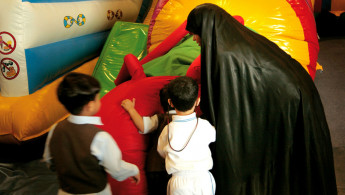A glimmer of hope for thousands of Bahrain’s children
Umm Sara is a Bahraini who separated from her Turkish husband 17 years ago. Her 17-year-old son and 18-year-old daughter have Turkish nationality, not Bahraini – though Bahrain is the only country her children know. They wave the Bahraini flag at the Independence Day celebrations, and she has applied for them to have Bahraini nationality several times since her relationship with their father soured.
The mother of two, who is in her thirties, has recently increased her efforts to persuade the state to accept her children's application. Her son is almost 20, the age of compulsory military service in the Turkish military. She has knocked on every door she can from the foreign ministry, the departments of immigration and passports to the Supreme Council for Women (SCW), and the king’s office in her struggle to ensure her children are given their constitutional rights. Her problem is not only with the state, the mother of two said: “Bahraini society looks down on me and my children, and some people try to take advantage of us.”
Umm Hussain is another woman trying to get
| Some children have been given nationality, but only in exceptional cases and only with the king’s blessing |
Bahraini nationality for her children, Hussain, 21, and 18-year-old Latifa. Their father has lived in Bahrain since they married, and has a Bahraini mother. Umm Hussain lives with her children in difficult circumstances in a small room in her father’s house waiting for the government to respond.
Some children in this situation have been given nationality, but only in exceptional cases and only with the king’s blessing.
The push for gender equality
Activists are calling for an amendment of article four of the Bahraini citizenship law which grants nationality to those “born in Bahrain or abroad when his/her father was a Bahraini at the time of birth”. They want to ensure gender equality and change the law so that children of Bahraini women are also granted nationality.
In January 2014, under intense pressure from activists, the Bahraini cabinet was on the verge of agreeing - under certain conditions - but deferred the issue to the legislature, according to legal and constitutional procedures.
This offered a glimmer of hope for around 2,000 affected people. Wajiha al-Baharna, head of the Bahrain Women Association, said that the precise number of people affected is unknown, because the last Bahraini census was back in 2006.
“Equality in transferring nationality isn’t meant to increase the number of children Bahraini women have with foreigners, [the argument of some opponent], it’s to give their children basic human rights as granted by international laws and charters,” said Baharna, who is also head of the Bahraini branch of the My Nationality is A Right for Me and My Family campaign that started in 2004, and also addresses the problem in other Arab countries with similar laws.
International conventions
Baharna has also worked for Bahrain’s Women’s Union [Arabic], which sends the United Nations Human Rights Council country reports and makes suggestions on ways to improve women’s rights to the UN Convention to Eliminate All Forms of Discrimination against Women (CEDAW).
Bahrain’s Supreme Council for Women has announced that the island nation is considering lifting restrictions on article nine of CEDAW, which says that states are required to “grant women equal rights with men with respect to the nationality of their children”.
Since the SCW was founded in 2001, the king has granted nationality to 2,634 children of Bahraini women with foreign fathers. But legal experts argue that all those affected should be given their basic rights according to the Bahraini constitution and international conventions, especially since Bahrain has ratified these conventions.
“This law is being considered by the government and in parliament. However, the recent period of legislative sessions finished before it could be discussed by the outgoing Council of Representatives. But it will be the first priority of the new council,” said Sawsan Taqawi, a member of the Council of Representatives and chair of the Foreign Affairs, Defence and National Security Committee.
Taqawi added: “Amending this law is an important social concern. If passed it will end the suffering of these children, who exist within a legal vacuum that has caused them many problems. This depends on Bahrain implementing the recommendations of the Human Rights Council during its universal periodic review of the country.”
This article is an edited translation from our Arabic edition.





 Follow the Middle East's top stories in English at The New Arab on Google News
Follow the Middle East's top stories in English at The New Arab on Google News


